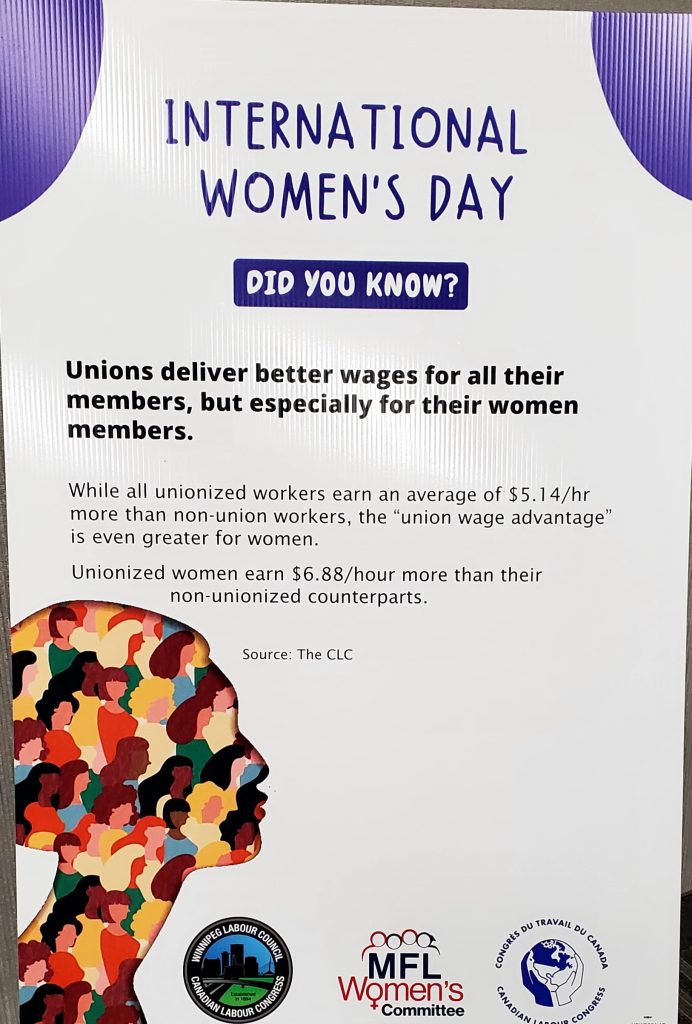
Today, MFL Women’s Committee empowers other women to continue the fight for the freedom, rights and equality of women in the workplace and in the society.
Let us celebrate, for every woman counts!


North Bay, ON – Fresh from a lengthy tour of the Maritimes, IAM Canadian GVP Stan Pickthall came back to Ontario for site visits at three IAM workplaces in the Gateway City of North Bay.
Almost every member of IAM Local Lodge 2412 got to meet and talk with Pickthall. “We did a day tour of Seymour Windows and talked with everyone on the day shift,” explained IAM Grand Lodge Representative Ralph Martin.
The site visits to the other IAM workplaces required 24 hour attention because of multiple shifts.
Atlas Copco, a manufacturer of air and gas compressors, diamond bits and drill rods used in the mining industry has two shifts, one day and one evening which required two visits so Pickthall could meet and talk to everyone. “The goal of these visits is to shake hands, meet our members and discuss their concerns,” said Pickthall. “It also gives me an opportunity to see for myself what a wide variety of products our members make.”
Boart Longyear is also involved in mining and exploration, manufacturing multiple lines of drilling equipment for core drilling surface coring, rotary drilling, directional drilling, sonic drilling and water supply drilling. “We visited with members on all three shifts,” said Martin. “We met with members over coffee at 1 in the morning and I think I surprised a few people on the overnight shift,” said Pickthall. “I might just be the last person they would expect to see at that hour of the morning but I wanted to impress upon them that they matter to their union.”
The tour also visited Fabrene Inc, which manufactures wide width coated and uncoated polyolefin products, such as housewraps, pool liners, interim landfill caps, lumber wraps, geo membranes and industrial packaging. “As you drive throughout Canada you see more and more of those membrane shelter covers for car ports, barn roofs and temporary garages and they’re manufactured by our members here in North Bay,” said Pickthall.
Manitoba’s public sector unions were working double-time Monday evening to stop the passing of two bills that will make sweeping changes to collective bargaining under the Pallister government.
Dozens of delegates lined up at two separate committee hearing rooms at the legislature to have their final say to government on two contentious labour bills before they become law in the coming months.
Union representatives ranging from Doctors Manitoba and the Manitoba Nurses Union to the Manitoba Teachers’ Society spoke out against Bill 28, which effectively takes wages off the bargaining table and institutes a two-year wage freeze for all future collective bargaining agreements.
Across the hall at another room, more gathered to speak out against Bill 29, which seeks to chop the number of bargaining units in the health sector from 183 to seven.
Representatives such as Manitoba Nurses Union president Sandi Mowat played double duty, speaking at both hearings. The contract for Manitoba’s 12,000 nurses expired in March, making it one of the first collective agreements to test the bill that will mandate two years of freezes, followed by a 0.75 per cent raise in the third year, and one per cent in the fourth.
“It infringes on our right to bargain,” said Mowat of Bill 28. “We are concerned that this bill actually infringes on our charter rights to bargain collectively.”
Mowat wouldn’t confirm that a legal challenge is in the works if the bill becomes law, but said her union is looking into the idea.
Manitoba Teachers’ Society president Norm Gould called the bill “Draconian” and said it contradicted promises made by Premier Brian Pallister that he would consult with unions before passing such legislation.
“Our hope is that they will come to their senses and allow us to go to the bargaining table and work this out,” Gould said. “It is not a public sector deficit, so to put it only on the shoulders of the public sector is improper and inappropriate.”
Today’s debt is tomorrow’s tax increase: CFIB
The committee hearings allow for private citizens to speak to government officials in a public forum and offer suggestions for amendments before the bills reach third reading and then become law.
Over 30 delegates were scheduled to speak at both meetings, with Finance Minister Cameron Friesen speaking for government at the Bill 28 hearings and Health Minister Kelvin Goertzen at the head of the Bill 29 hearings.
While the vast majority were speaking in opposition to the bills, the government had a cheerleader in the Canadian Federation of Independent Business. Its director of provincial affairs, Jonathan Alward, presented in favour of the bill, saying all Manitobans are bearing the brunt of a massive deficit and something has to give.
“Today’s deficits, today’s growing debt, are going to translate to tomorrow’s tax increases,” he said.
“At the end of day, private sector companies have difficult decisions to make … the government is in that position right now,” Alward told CBC News. “They (the unions) are only showing one side of the story … this type of a wage freeze is a difficult, but necessary decision.”
‘We must do our best’: Pallister
The government has been firm on its stance that both bills are necessary to get the government’s fiscal house in order. When asked about the bills in question period by the Opposition NDP, Pallister reiterated that his government inherited a “fiscal challenge.”
“We must do our very best” to fix that, Pallister said Monday.
Pallister has previously said a one per cent increase in public sector salaries costs the government $100 million.
As for limiting collective bargaining units, Goertzen told CBC News last week that the measure will bring Manitoba in line with the rest of Canada.
He said British Columbia has five collective bargaining units. In Saskatchewan there are 14. Bill 29 would drop the number in Manitoba to seven from the current 183.
“There is so many different bargaining units, which means there is so many different labour agreements, which means every time somebody is trying to schedule somebody … or ensure there is proper coverage in a hospital or on a ward, we have to check to make sure that the individual collective agreement allows somebody to do it,” Goertzen told CBC News.
The bill also would lead to the appointment of commissioner who could supercede rulings by the Manitoba Labour Board and would not be accountable to legal challenges.
Unions will have to wait and see
Mowat said she didn’t understand the need for the bargaining unit bill, explaining that most of the units in the health care system bargain together. She also said it would also further disrupt a health-care system that is already in the midst of a major revamp with the closing of three emergency departments in Winnipeg.
“To get all these health-care unions to have to have runoff votes is not something we need right now when the health-care system is already pretty disrupted,” she said.
She described it as “interesting” that the government would appoint a commissioner.
“We will have to wait and see what the regulations say at the end of this,” she said of the appointment.

Portraits of workers in the factory. Shallow DOF. Developed from RAW; retouched with special care and attention; Small amount of grain added for best final impression.16 bit Adobe RGB color profile.
October 7, 2017 will mark the 10th anniversary of the World Day for Decent Work, a day when unions around the world unite in action for decent work.
What is “decent work”?
Access for all workers to quality jobs, dignity, equality, and safe working conditions.
Putting workers at the centre of development and giving them a voice in what they do.
This year’s global focus is on struggles to win living minimum wages and a pay raise for all workers.
The Canadian Labour Congress has outlined steps Canada needs to take in a letter to Prime Minister Trudeau, outlining several steps the federal government can take to ensure better access to decent work at home and abroad.
“We need federal leadership on decent work, not just so that we improve work for Canadians, but so we can set an example for other countries too,” said CLC President Hassan Yussuff.
What our federal government can do
Ensure the creation of high-quality jobs needed by millions of unemployed, underemployed, and precariously-employed workers in Canada.
Promote and uphold collective bargaining rights at home and abroad.
Restore the federal minimum wage to $15 per hour, indexing it to wage growth, and bring back full employment as a primary policy target.
Create public employment programs for regions and populations with high unemployment or a high concentration of low-wage workers. That should include job creation programs for youth, Indigenous and Northern communities, newcomers to
Canada, Alberta and the Atlantic provinces;
Commit to long-term funding for high-quality, public, universal, affordable child care;
Adopt strong, proactive pay equity legislation incorporating the recommendations of the 2004 Pay Equity Task Force;
Use all available tools to eliminate discrimination in hiring, promotion, and pay, including strengthening the Employment Equity Act and the Federal Contractors Program;
Introduce paid sick leave and paid leave for victims of domestic violence for workers in the federal jurisdiction, and encourage provinces and territories to follow suit;
End the systematic violation of migrant workers’ rights by abolishing tied work permits and implementing a proactive compliance assessment and enforcement regime;
Promote fairness by tightening regulations on hours of work and scheduling;
Increase staffing, training and resources for federal employment standards and health and safety inspectors; and
Improve the Wage Earner Protection Program to better protect wages when employers go bankrupt or simply disappear.
Canada’s unions are also asking the federal government to promote decent work in global supply chains and the extractive sectors by:
Appointing a human rights ombudsperson to investigate how Canadian companies’ foreign operations impact human rights;
Introducing national due diligence legislation with a monitoring mechanism and an enforcement procedure for large companies.